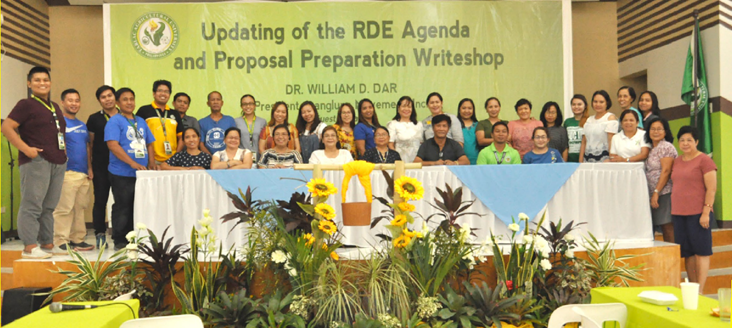RET conducts workshop to update TAU-RDE agenda

Eyeing to generate an updated and relevant RDE Agenda aligned to the thrusts and priority programs of national government agencies aimed towards achieving national and regional development goals, the Research, Extension and Training (RET) Unit of the Tarlac Agricultural University spearheaded the “RDE Seminar-Workshop: Planning of the TAU Research, Development and Extension (RDE) Agenda 2018 and Framing of Winning Research and Extension Program Proposals” on April 12, 13 and 20 at the TAU Hostel Conference Hall and Farmers’ Training Center, respectively.
The first day of the activity highlighted the updating of a relevant, responsive, and sustainable TAU RDE Agenda wherein Dr. William D. Dar, former Director General of the International Crops Research Institute for the Semi-Arid Tropics (ICRISAT) and the founder and incumbent president of InangLupa Movement that advocates agricultural modernization and rural industrialization, served as the guest speaker.
In his lecture, Dr. Dar emphasized the need to strengthen RDE for a globally competitive agriculture industry. According to him, agriculture has to be treated as a business with expected gains and profitability as ‘agripreneurship’ is the game changer to reduce poverty and enhance prosperity.
“Instilling the spirit of entrepreneurship in agriculture can work wonders because it has the potential to contribute to a range of social and economic developments such as employment generation, improvements in nutrition, income generation, overall food security and eventually, poverty reduction,” Dr. Dar declared.
He further stressed out that in order to create an inclusive agribusiness which will provide opportunities to enable small farmers to become economically viable partners with the big players in the market-value chain, there must be a unified and inclusive ecosystem that is comprised of: responsive and relevant government policies; regulatory framework and infrastructure; funding and finance; science and technology/research For development and innovation endeavors; development, extension and training initiatives;
And continuing education. Mentors, advisors and support system; human capital and workforce; culture; and market links are also driving factors to attain inclusive agribusiness.
Also present during the opening day were Dr. Arthur D. Dayrit who presented the RDE agenda of the Department of Agriculture- Regional Field Office 3 (DA-RFO3); Dr. Julius Sicat, Director of Department of Science and Technology-Regional Field Office 3 (DOST- RFO3), who talked on the thrusts and priorities of DOST; and Engr. Roy M. Abaya, Director of DA-RFO3, who lauded the TAU community for its efforts to set its RDE directions toward attaining sustainable growth and development in the region and in the whole country.
The afternoon of the first day focused on a workshop on the preparation of the RDE agenda of the different Colleges of the University. Said workshop started after Dr. Cielito A. Beltran, TAU Director for Research and Development, and Dr. Yolanda S. Guillermo, the Extension and Training director, presented the existing University research and development, and extension and training agenda, respectively, which served as bases for updating and validating each College’s thrusts and priority programs.
The workshop was participated in by various faculty researchers of the University who were train to formulate research proposals in line with the priorities of funding institutions.
“With the current situation among faculty wherein many are new and young, only a few are involved in collaborative and funded research projects. This perhaps can be attributed to the non-familiarity of faculty in the thrusts and priorities of funding agencies and the inadequate ability/skills of faculty in formulating research proposals,” Dr. Beltran said.
“However, there are those who are willing to engage in RET activities, and so we must help them to build their confidence, hone their skills, and gain more exposure. Mentoring and engaging them in a workshop like this will be the most appropriate strategy,” he added.
Outputs from the workshop were presented and reviewed during the second day. The activity was underscored by the integration of insights from the participants towards the betterment of TAU RDE agenda.
Meanwhile, on the 20th, the updated RDE agenda was presented to the various TAU stakeholders for review, validation and finalization. Said evaluation was attended in by University officials, faculty researchers, department heads, research and extension coordinators, student representatives, farmer leaders and local government officials, members of various people’s organizations, and representatives of different provincial and regional government agencies.
During the presentation, issues on RDE implementation from their respective offices were brought out by the participants. These were suggested to be included as among the priorities of the University. Comments for the betterment of the updated agenda were also provided by the attendants.
Dr. Tessie E. Navarro, the Vice President for Research, Extension and Training (VP-RET) said that the updated agenda will play a crucial role in the realization of TAU’s RDE focus in the coming years.
“It clearly sets out what will be the strategic priorities of RDE at the University and this will enable faculty members, students and partner organizations to focus their RDE efforts along these priorities,” she declared.
She added that the new agenda reflects the responsibility and commitment of TAU to support research, development and extension endeavors that are responsive to the needs and pressing challenges facing the TAU community, the region and the country.
“This updated agenda will serve as roadmap and an institutional guide for a wide range of TAU-driven research activities. Hopefully, it will help create and strengthen the many partnerships between the University and various organizations in terms of research and extension initiatives,” she ended. (JCabatic, RET)















